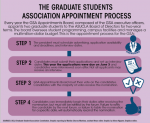This post was updated July 2 at 9:35 p.m.
Graduate students raised concerns about the way student government officials conducted an appointment process for the Associated Students UCLA Board of Directors.
UCLA’s Graduate Students Association officials called an emergency forum during finals week to discuss the appointments process. The meeting was called in response to a petition signed by 31 graduate students that was submitted to the GSA vice president of internal affairs.
The GSA Appointments Board is a committee made up of four elected GSA officials and is responsible for appointing stipended graduate student representatives to GSA and UCLA boards and committees, such as the ASUCLA Board of Directors.
Every year GSA appoints two graduate students to the ASUCLA Board of Directors for two-year terms. Student representatives make up the majority of the board, which oversees a multimillion-dollar budget. They also receive one of the highest stipend amounts of any student representative position.
David Pederson, who applied to be an ASUCLA representative but did not receive the post, said he found some parts of the application review process troubling because he thinks the GSA Appointments Board did not comply with the GSA constitution.
The constitution states that all committee meetings must follow Robert’s Rules of Order and must keep written records. Robert’s Rules of Order are a set of guidelines for how to conduct meetings.
When Paul Kurek, another candidate who was not selected for the position, asked for these records, the Appointments Board said they had not followed those procedures, Pederson said.
Kurek did not respond in time for comment.
GSA President Zak Fisher said the Appointments Board has historically not operated with the same regulations as other committees because of the sensitive nature of the board’s duty, which includes evaluating individual candidates and their qualifications.
“The fact that it makes employment decisions, the fact that it has to talk about potential drawbacks and pros and cons of certain candidates’ profiles, and, as a candidate who has gone through this process before, I sort of assumed that’s not the sort of stuff I want people talking about in public,” Fisher said.
Fisher said he was told by the student union director, Roy Champawat, that the appointments should be made as soon as possible to allow for them to participate in an ASUCLA Board of Directors orientation retreat taking place June 14.
He said to accommodate this request, he set the application deadline for June 3 and planned to complete the appointments by June 10 – 12 days after GSA executive officers were sworn in.
However, the Appointments Board was unable to host interviews together or meet due to scheduling conflicts, so interviews were conducted by either one or two board members. Audio of interviews conducted by one member was shared among the board members, and discussion of candidates happened via phone calls or digital communication, Fisher said. Votes for the candidates also occurred through digital communication.
Proponents of the resolution discussed in June argued that the fact there was never a meeting in accordance with Robert’s Rules of Order inhibited the board’s ability to have a fair discussion about the candidates.
“If this is the way GSA is going to be appointing people to stipended positions and lots of other positions this year, that’s just a really bad sign,” Pederson said.
Paul Nesterenko, GSA vice president of internal affairs, said while the process happened quickly and the council was new to the process, he believes all candidates were treated fairly and with due process.
Nesterenko called the emergency meeting but was not in attendance. He said although he did not support the resolution, he called the meeting because it met the emergency forum requirements listed in the GSA codes.
The GSA codes state that an emergency forum can be called by two-tenths of one percent of the graduate students. The 31 signatures on the petition met the minimum requirement, which needed 28 graduate students in the 2018-2019 school year.
Nesterenko said he did not support the resolution because parts of the resolution’s description of the surrounding situation appeared to be based on hearsay. Additionally, he said he thinks the resolution, which calls for an impartial board to redo the process, is not correct since any issues with the appointment process would have to be resolved internally according to governing documents.
Fisher said he thinks the meeting was a waste of time and an inappropriate way to use the emergency meeting option, considering the meeting took place during finals week.
Ultimately, the emergency meeting did not have enough members in attendance to vote on the resolution. Any possibility of discussion depends on whether or not it is on the agenda for the first forum of fall quarter.
Pederson said he is exploring options to discuss the resolution in fall, such as asking Nesterenko, who is in charge of setting the GSA forum agenda, to put the resolution on the agenda or calling a special meeting during a forum break.
He said he thinks the issue of proper procedures goes beyond this particular appointment decision. Pederson added he wants to ensure that all future applicants for stipended and nonstipended positions receive due process.
Nesterenko said given the lack of support expressed by forum members who did attend the emergency meeting, and since the forum will have to ratify the appointments at the first forum of fall quarter anyway, he does not think he will put the resolution on the agenda in the future.
Fisher said for the sake of making the process more transparent, the Appointments Board plans on voting on candidates in a written space where all members are present and their votes are recorded. He added despite this modification, he does not think the original way in which the appointments were made was invalid.
